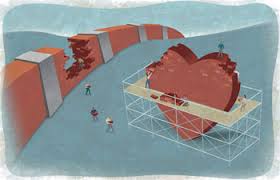
Mediterranean refugee crisis and xenophobia. Eurozone and Greece bailout. War in Ukraine. ISIS. These are just some of the latest world news headlines, the ones that reflect the current geopolitical instability, and involve a lot of arguing, in-group out-group categorizations, blaming one another, confrontation, fear, aggression and intolerance. These issues are global, hence we need to find global solutions, start understanding each other and ‘make the world a better place’. Luckily, the latter is not just an empty term, as some scientists have valid ideas on how to do that.
Tania Singer, a social neuroscientist from The Max Planck Institute, argues that training our brains can help make the world a better place. Singer believes that we need to develop global compassion, we need to start understanding other cultures and religions, we need to become global citizens, so that we can make better decisions, improve pro-social behavior, and global cooperation. According to years of research evidence all the above-mentioned is possible due to our brain’s plasticity – the capacity of our brains to change, that is to create new neural pathways, alter existing ones, and also change the brain’s physical structure. In essence, neuroscientists have found that through mental training people can increase their cortical thickness, i.e. the volume of grey matter, in the brain.
Incorporating the ideas of neuroplasticity into the arena of global matters, Prof. Singer presented her work in the World Economic Forum of 2015, making a case for what is called ‘caring economics’. In contrast to the mainstream perception of human beings as selfish actors, the so-called homo economicus, who operate with the only aim of advancing their own benefits, in ‘caring economics’ the main human motivation is compassion. Within their ReSource project Singer and colleagues gathered compelling evidence that humans can be motivated by care and compassion just as easily as they can be by power, achievement, consumption or fear. Within the care motivation system though, humans are able to make better decisions for society, which work towards global cooperation and sustainability.
In the ReSource project around 300 subjects were undergoing an intense mental-training program, which aimed at developing such mental capacities and social skills as attention, mindfulness, self-awareness, perspective-taking, empathy, compassion, and the ability to cope with difficult emotions like anger or stress. Although highlighting that lasting changes may be possible only after a prolonged and regular period of training, the results of the project showed that it is indeed possible to change human behaviors towards more altruistic and pro-social ones. In other words, it is possible to train our brains in the areas of mindfulness, compassion and cognitions. With proper and lasting training we can make changes to our brains and ‘rewire’ ourselves to caring motivational structures, which will help us to become better with ourselves and one another, thus making the world a better place.
Although no such mental-training is currently available for the wider population, the work of Prof. Singer is motivating and looks very hopeful. As Tania Singer herself notes, the concept of caring economics and such secular ethical mental-training is applicable in education, business, political and health-care settings, and urges policymakers to ‘take the lead in promoting this science-based approach to learning and working’. Importantly, Tania Singer’s approach seems to highlight the idea that solutions to global problems could actually start also from personal change.


I confess I am not that surprised by Prof Singer findings. Actually attitude towards existence can be trained and you see the impact in your area of influence soon. It is great to have somebody putting a frame to our thoughts
By the way, although it would be great to have our policy makers taking care about all this, I am afraid we better take the Prof. Michael Jackson approach :):):):):):):) “if you want to make the world a better place, take a look at your self and make that….change!!”